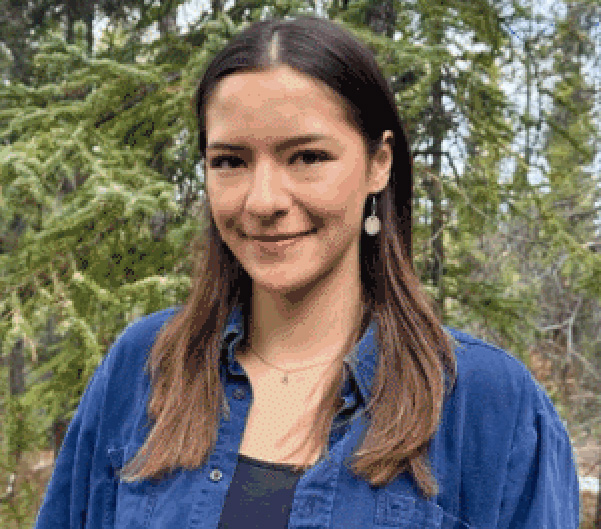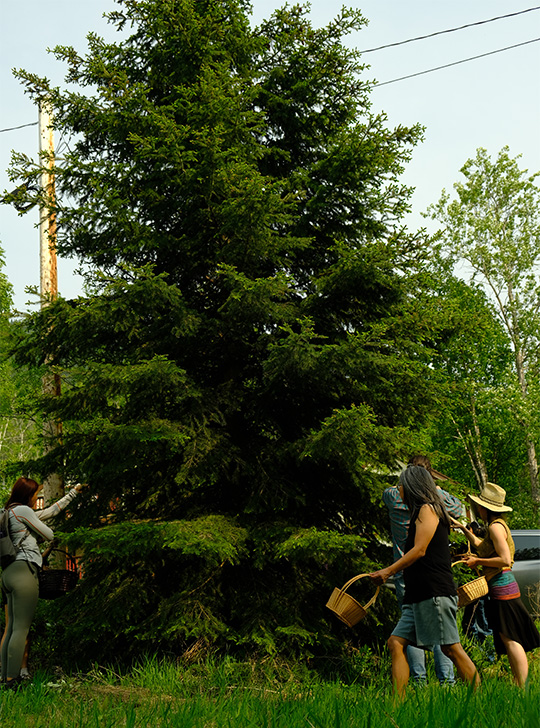Yukon youth lead the way for Indigenous health solutions

Many Indigenous Peoples who grow up in small communities face health disparities that aren’t just a statistic, they’re personal.
Piper Fordham saw this firsthand as part of the Teslin Tlingit First Nation in Yukon. Her friends, family, and Elders navigated a health system that often felt cold, clinical, and disconnected from their land-based way of life.
Piper is now a Research Assistant with the Yukon SPOR SUPPORT Unit (YSPOR) but began her YSPOR career through its Junior Researcher Program. In this role, she heard from the community that even the smallest gesture, such as being offered a traditional meal or a warm cup of tea, while in health care settings could have brought comfort, dignity, and a sense of home amid hardship. This inspired Piper’s research project to help Yukon’s Dawson City Community Hospital (DCCH) provide more culturally welcoming services and spaces for Indigenous communities and First Nations.
A local group of Elders and Knowledge Keepers called Gu Nähtsey (which in the Hän language means plants we all pick/harvest) was already strengthening community health through plant medicine and Indigenous healing methods and exploring how to bring them to hospital settings. At the same time, DCCH had expressed interest in working with the local Tr’ondëk Hwëch’in community to make the hospital more inclusive.
Piper started working with Gu Nähtsey, learning about plant medicines and land-based living and healing, as well as getting their input on how to engage with the community. She also continued discussions with DCCH and the Yukon Hospital Corporation for insights from the provider’s perspective. This work became the Supporting Access to Care [ PDF (2.9 MB) - external link ] study.
YSPOR guided Piper in carrying out traditional research such as literature reviews and data analysis, while Gu Nähtsey guided her to integrate these methods with Indigenous culture through storytelling and relationship building.
As Dr. Michelle Leach, YSPOR’s Scientific Director, explains, Piper’s research went far beyond standard data collection. “It wasn’t just ‘Here’s a link to a survey, go fill it out.’ It was sitting down with people to fill it out, having tea together, attending the Elders’ lunch,” she says. “It was done through conversation, listening, food, tea, and building relationships.”

The result? A research report with recommendations for DCCH on how to improve Indigenous patient experiences, with practical actions like creating a dedicated space for cultural ceremony, providing outdoor access to connect with the land, offering traditional meals and tea, and incorporating plant medicine where possible.
YSPOR, DCCH and the Yukon First Nations Health Program are now working to turn the recommendations into reality. A new study is also aiming to build upon the research to support culturally grounded care in other Yukon health care settings.
Piper’s work is just one example of community-driven research from YSPOR’s Junior Researcher Program. Since 2023, six Junior Researchers, most of whom are Indigenous, have led research projects to improve health and well-being in their communities. They follow the same ‘strength-based approach’ to research as does all YSPOR’s work — focusing on positive impact, rather than looking at what’s wrong or needs to be fixed.
YSPOR launched in 2021 with territorial and federal funding through CIHR’s Strategy for Patient-Oriented Research (SPOR) to create a SUPPORT Unit (Support for People and Patient-Oriented Research and Trials). SPOR SUPPORT Units work to bring patient, caregiver and community voices into research and patient-focused evidence into health care.
Through its community engagement, YSPOR saw that Yukon youth were looking for ways to help their communities and so it created the Junior Researcher Program. The program recruits high school students, high school graduates and post-secondary students, most without prior research experience, but who are eager to learn and make a difference.
Julia Gyapay, a Research Professional with YSPOR says that the Junior Researcher Program shows that beneficial health research can come from students at all ages and levels. “Youth are so passionate and know their community’s needs. Providing them mentorship and the chance to build skills and experience has been special to see.”
At a glance
Issue
Historically, research focused on Indigenous Peoples hasn’t incorporated Indigenous ways of knowing and approached the work from a deficit perspective — investigating a problem instead of researching positive impacts.
Research
With guidance from the Yukon SPOR SUPPORT Unit, youth are working with their communities as junior researchers to develop solutions for local Indigenous health care needs. Piper Fordham’s Supporting Access to Care study gave the Dawson City Community Hospital practical ways to introduce or expand culturally welcoming spaces and services.
Learn more: YSPOR Junior Researchers
- Date modified: